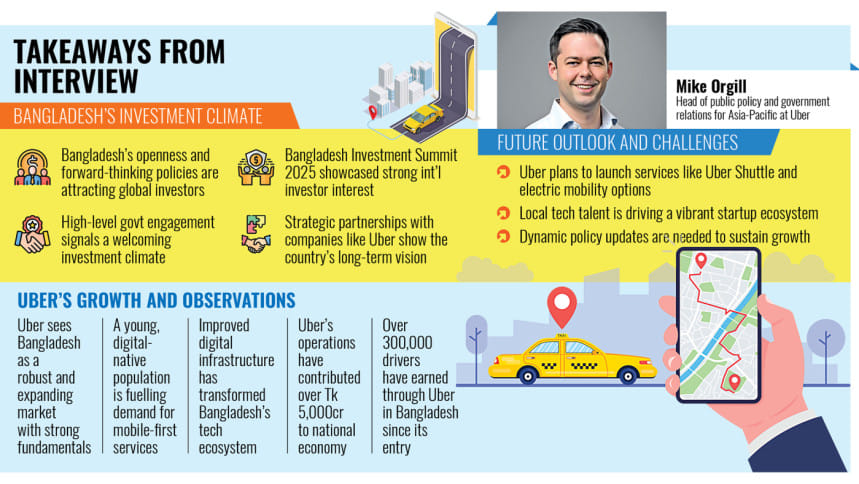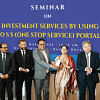Bangladesh draws growing attention of foreign investors

Bangladesh is increasingly attracting foreign investors, especially in the fields of technology and digital services, according to Mike Orgill, head of public policy and government relations for Asia-Pacific at Uber.
This rising interest reflects the openness of the government, its willingness to engage and efforts to maintain a policy dialogue with investors, strategic partners and global companies, said the top executive of the American multinational transportation company that provides ride-hailing services.
"These developments are helping boost investor confidence and opening up broader opportunities for innovation, growth, and long-term development," he said during an interview with The Daily Star.
On the sidelines of the recently concluded Bangladesh Investment Summit in Dhaka, Orgill said, "The government's active engagement with the international business community reflects a positive signal."
"It shows that Bangladesh is keen to welcome investment," he added.
According to the Bangladesh Investment Development Authority (Bida), the four-day summit, jointly organised by Bida and the Bangladesh Economic Zones Authority, received initial investment proposals worth Tk 3,100 crore.
The Uber executive pointed to recent meetings with the interim government as evidence of a policy direction aimed at building meaningful partnerships, especially with companies that have maintained a sustained presence in Bangladesh.
Such engagement is timely, he noted, as countries around the world are vying for foreign direct investment and striving to position themselves as centres for innovation.
He said that the government's attention to platforms like Uber was not merely symbolic but strategic. "These interactions show a willingness to embrace global best practices, consider policy reforms, and unlock new avenues for growth."
Orgill also welcomed the tone of recent public statements from government officials, noting that their focus on digitisation, inclusive growth, and youth employment closely aligns with Uber's mission and broader goals for a digital economy.
"It's very exciting to see how the government is focused on attracting international investment," he said after a meeting of US delegation with Commerce Adviser Sk Bashir Uddin.
"It's also very encouraging to see them spend time with companies like Uber that have been in the market for some time and continue to develop that partnership."
"I think it is a really important signal to investors like us. It was also exciting to hear -- I am not sure if you saw some of the speeches -- the forward-looking ideas the interim government presented. So yes, I was very happy to be here."
Beyond government relations, Uber's experience on the ground points to strong market fundamentals. Despite the evolving nature of urban mobility, demand for Uber's services in Bangladesh continues to rise, backed by an engaged and growing customer base.
"This momentum shows that the Bangladesh market is not only emerging, it is expanding," Orgill said.
He credited much of this growth to the country's youthful and tech-savvy population.
With a median age under 30, the country offers fertile ground for mobile-first services. There is a rising demand for digital platforms that improve daily convenience and connectivity -- ideal conditions for companies like Uber that depend on flexible workforces and digitally fluent users.
At the same time, key macroeconomic trends are also moving in the right direction. Urbanisation is accelerating, fuelling demand for accessible, reliable, and cost-effective transport.
From Uber's perspective, these are not future possibilities but present realities shaping operations and expanding the user base.
"We continue to have a strong business here," Orgill said. "Consumers are increasingly using the app. So, I see it as a robust market for us. And I think the macroeconomic conditions here are pretty inspiring."
"Look at the population growth, the age of the population. There is a really young, talented workforce. Digital penetration is growing. All these factors make Bangladesh a growing market for any industry. From Uber's perspective, there is a lot to be excited about."
He said another key enabler has been the improvement of digital infrastructure.
A decade ago, limited smartphone use and patchy internet access made the adoption of digital services difficult. Today, widespread 4G coverage, affordable mobile data, and the growing use of digital wallets and apps have made it easier for Uber to connect with riders and drivers alike, according to the executive.
Orgill said Bangladesh is no longer just a consumer of global tech solutions; it is now cultivating a vibrant innovation ecosystem of its own.
He praised the growth of local tech talent, which is driving a new wave of start-ups and digital platforms tailored to local needs. "It is growing so fast, right? Everybody is on their phones. Internet connectivity is superfast these days."
"I have been coming to Bangladesh for over 10 years. Back then, internet penetration was very low. You could not get devices. And now, everyone has 4G smartphones. It is just a completely different ecosystem."
"And what is inspiring is the remarkable local tech talent. It is not just large foreign players anymore -- there is a robust, growing native ecosystem driven by Bangladeshi talent solving local problems."
Since launching in Bangladesh eight years ago, Uber says more than 300,000 drivers have earned income through its platform. In the past year alone, it estimates its economic contribution to be over Tk 5,000 crore, largely from driver earnings and related activities.
"That's a significant contribution to Bangladesh's economy, and it's growing. I am proud of that impact. Proud to be a part of it. And this is a market we are very committed to."
In the future, Uber plans to introduce new services such as Uber Shuttle and electric mobility options, aimed at further adapting to local needs and environmental priorities.
"The government's active engagement with the international business community reflects a positive signal," the Uber official said.
However, Orgill acknowledged that challenges remain, particularly regarding policy frameworks. Chief among them is the issue of fare caps, which have not been revised in over a decade.
Uber argues that this limits its ability to adjust pricing based on supply and demand, making it difficult to ensure consistent service and fair earnings for drivers.
Despite such hurdles and challenges, Orgill remains optimistic.
"This is a market with enormous potential," he said. "The signs are encouraging, and our commitment to Bangladesh is deep."

 For all latest news, follow The Daily Star's Google News channel.
For all latest news, follow The Daily Star's Google News channel. 








Comments